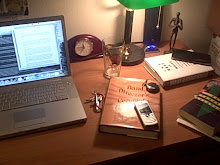This post is part of a blog project on student teaching, hosted at So You Want To Teach
Most of my job consists of doing whatever the director doesn't want to do, which is a lot. On paper, I'm little more than an aide, something his student T.A.'s could do: be more mobile than the director (he's post-polio) and facilitate an efficient rehearsal. I make copies, grab scores, part music or file it away, take attendance and enter everything into his grade sheets. Sometimes I get to re-arrange music or write out new parts with Sibelius, other times I work as a section coach with any particular section while the director works with the rest of the band. But the reason I show up every day, and would do so without being paid is the chance to conduct the DHS bands.
When I played with the UC Davis wind ensemble, we'd go to a gig every year called the "Festivity of Bands" it was the "Causeway Classic" for band nerds. CSUS and UCD give a joint concert, pitting the wind programs of each music department against the other. Well, for a few years now they've been inviting the audition ensemble from Davis High to come play with them, and I was always a bit bitter leaving knowing we were schooled by a bunch of high school kids. They played harder music than we did and sounded better doing it.
This of course is the result of an amazing amount of support from the school district and community in Davis and is completely not representative of any public school program I've ever seen. Last year, when the Governator decided to cut the budget 10% across the board, we were going to lose funding for all elementary band and orchestra programs, and the community promptly raised over $400,000 for the "Save our Music" Campaign, and then voted to implement a parcel tax to cover the expenses for the next 3 years, saving the programs and teachers who had been pink-slipped.
I get to work with kids who are musically literate and have a musical maturity greater than some college ensembles. They can sight read anything and sound decent doing it. They regularly play grade 5 and sometimes grade 6 music. The non-audition ensemble, with which I get to work, regularly starts the year at grade 4 and works their way up, auditioning on grade 5 stuff by the end of the year. Last year as an undergraduate and now working towards my credential, this is experience I can't get anywhere else. I'm allowed to peruse a huge catalogue of music and choose pieces that I get to rehearse with the band and conduct in concert, going through the whole process as a director from start to finish and perfecting my skills and confidence at the podium. Right now I'm walking around with about 30 scores in my backpack preparing for a fundraiser for the kids: an all night band-geek-a-thon where I'm responsible for keeping them playing music -all sight reading- from midnight until 7:00am at which point they are to pull together, rehearse three pieces and perform a concert for those parents picking them up - with whatever lips they have left.
Basically, I'm spoiled for the rest of my career and have a template from which to work and build my own band programs. One that starts with strong elementary and junior high programs.
Anyways, the Symphonic Band got their hands on a piece called Masada and have been working on it since January 5th - they're two and a half weeks in and still a little shaky. The piece is a programmatic work depicting a great siege of the Judean fortress, casting the Romans in sober, relentless 4/4 time and their Hebrew adversaries in complex dance rhythms (generally asymmetric meters that flop around i.e. 5/8 [7/8] changes from 3-2 [-2] to [2-] 2-3, mixed in with 2/4, 3/4 or 6/8 for good measure). I convinced the director to let me take the score home with me over the MLK weekend and obsessed over it for three days, trying to work out the rhythm patterns. The goal was to come in during their final period to put together some audition tapes for my meeting with faculty at UOP next Monday; hopefully to prove I'm a technically competent conductor when it comes to negotiating a teaching assistantship to support my graduate studies. I realize now that the video is not as impressive to look at when compared to the score (the composer or maybe publisher created his own meters to save on ink because the meter changes almost every bar). I had my head buried in the score, and couldn't think past the rhythms enough to do anything but mirror with my left hand, but it was a nice change from the slow, lyric pieces I normally get to work with (the ones the actual director would rather not conduct). In short, this is why I love what I do:

No comments:
Post a Comment